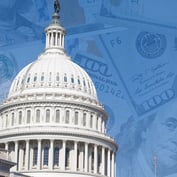Gingrich Says Effect Of Jeffords Switch Won’t Be ‘Dramatic’
San Antonio
While the recent shift of power to the Democrats in the U.S. Senate has some predicting that sweeping changes are coming, Former Speaker of the House Newt Gingrich said the effect on legislation in general, and on the insurance and financial services industry in particular, will not be “dramatic.”
Gingrich, the keynote speaker at the IASAs 73rd Annual Educational Conference and Business Show, called the recent announcement by Maine Senator James Jeffordswho had been elected as a Republicanthat he is now an Independent “a symptom” that indicates the Republican party needs to change.
He added, however, that “the Republicans will get 80% of what they would have gotten anyway.”
While a single vote advantage means “you rule” in the House of Representatives, said Gingrich, in the Senate “you have to have 60 votes to overcome a filibuster.” Thus, the single vote shift to the Democratic side might not be as much of an advantage as some observers think, he explained.
Gingrich addressed a wide range of topics at the conference.
He began with commentary on the effects and potential of the information revolution. Pointing out that most of us already trust the technology involved in ATMs, Gingrich stressed the fact that such devices are “astoundingly accurate,” while systems in other critical areas, such as medicine, may not be.
Applying the kind of accurate technology involved in ATMs to hospital settings “would save 40,000 to 80,000 lives per year” by eliminating medical errors, he noted. “Twenty-five percent of senior citizen emergency room visits in Rhode Island are caused by wrong prescriptions,” he observed.








 June 21, 2001 at 08:00 PM
June 21, 2001 at 08:00 PM









